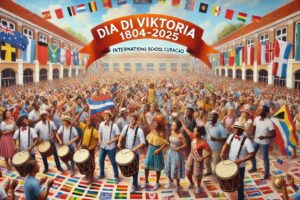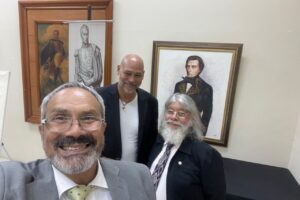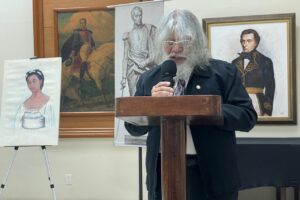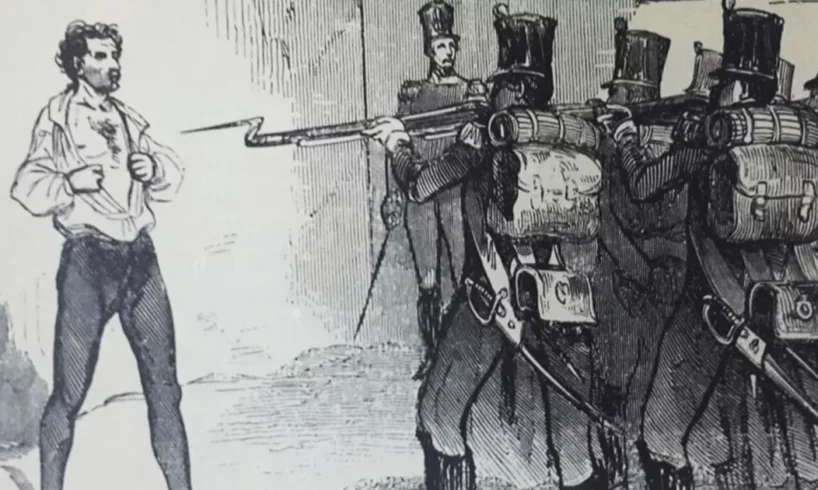
General Manuel Carlos Piar, hero of the Battle of San Félix, who opened the doors of Guayana to the patriots and de facto decided the course of Venezuela’s Independence, was executed by firing squad on October 16, 1817, against the west wall of the current cathedral of Santo Tomás, in Angostura (today Ciudad Bolívar).
Accused by the Liberator Simón Bolívar of “rebellion against the supreme authority,” he was captured and tried. Rafael María Baralt, in his History of Venezuela, recounts the passion and death of the general.
The Maracaibo-born Baralt (1810-1860) published his Summary of the History of Venezuela in 1840, just 23 years after the execution of the Curaçao-born general.
By this time, however, General Bolívar was preoccupied with his troubles and those of the republic, trying to curb the progress of a rebellion attempted against the supreme authority with which he was vested. It was Piar’s ambition and insane pride that provoked this new bitterness, whose origin must be sought in the small congress of Cariaco.
We have already seen that this assembly’s ridiculous maneuvers had sympathies in Guayana and that Piar, in particular, was pleased with them, as he hoped to obtain from Mariño the supreme command of that army.
The victor of San Félix could not endure that the Liberator snatched away the satisfaction of entering Guayana triumphantly, taking advantage of his efforts, without realizing that these did not lose their merit because Bolívar perfected them and that, in reality, the plan conceived by Cedeño and initiated by him should necessarily be carried out by the supreme leader.
The capture of Angostura would be of little value if it were not linked with the subsequent operations of all the republican forces. And who, if not Bolívar, could secure the obedience of so many rival and ambitious leaders?
Who but he could make their valuable participation in the general plan of the campaign, imposing silence on their eternal disputes over the exercise of authority and the direction of the war? But Piar’s irritable and violent vanity prevented him from seeing these truths. Subsequently, as he became more and more poisoned by his unreason, he was led to the horrific project of destroying both the Liberator and the republic.
His first step was to request, with the most effective insistence, permission to leave the army and seek treatment within or outside the territory. There was no person of influence with the Liberator whom he did not bother to obtain a leave that the latter stubbornly refused to grant.
Either because he believed him necessary in the army or because, seeing his secret discontent, he did not want to increase it by giving him the pretext to complain of ingratitude and disservice; but finally, his efforts were so persistent and tenacious that Bolívar, reluctantly, no longer able to ignore them, granted him the retirement he requested on July 30 in San Miguel.
No sooner had Piar obtained it than he put his plan into action, went to Upata, and began to speak disgracefully of the Liberator, aiming to undermine his credibility, promote division among the leaders, disobedience in the troops, and what is more, to revive in the army the proscribed and forgotten idea of colors, inciting war between the races.
Once Angostura was occupied, Piar moved there and, becoming increasingly irritated and blind, wrote to several mulatto leaders, urging them to disavow the authority of the supreme leader and to establish a new order of things according to the atrocious and absurd plan he proposed.
At first, the Liberator wrote to him amicably, calling him to resume his position in the army, although without acknowledging his criminal schemes. However, seeing that these continued and he scorned his clemency, he ordered him arrested in Angostura.
Upon hearing this, Piar fled to Maturín, where he agreed with Mariño and some other rebels to start gathering people. Never in his life did Bolívar demonstrate more skill and presence of mind than then.
Piar was a bold and strong man; he was resentful, and he contemplated using weapons of a destructive nature: men equally ignorant and unruly, equally enemies of any restraint and discipline, could very well, inspired by the example, the fame of the leader, and ingenious inclinations, join the enterprise and raise the banner of disobedience: the troops, loyal to Piar, who had led them to victory, and commanded by leaders of his same ilk, did not provide much guarantee of subordination and loyalty: there was no populace: the misery was horrendous; it and the plague produced by the siege of Angostura had depressed spirits in the town and the ranks.
In this situation, conducive to making any novelty triumph that would lead to a change in the existing order of things, what support did Bolívar have? A few loyal leaders are genuinely devoted to their people, friends of order, and sufficiently knowledgeable to see the best hope for recovery in its preservation. Let us find out what he did with all this.
This prudent conduct had the desired effect, and Piar, abandoned by everyone, went to Aragua de Cumaná, seeking the protection of those discontented followers loyal to Mariño. Cedeño and commanders Juan Francisco Sánchez and Juan Antonio Mina, charged with capturing him, found him in that town escorted by a large body of cavalry under the command of the intrepid Francisco Carmona. Still, Carmona, following the orders of the Liberator, offered no resistance, and Piar was immediately arrested and taken to Angostura with all the considerations due to his rank and misfortune.
The trial was promptly initiated and carried out. The council of war of general officers convened in the quarters of Admiral Brion, its president. The members were brigade generals Pedro León Torres and José Antonio Anzoátegui, colonels José Ucrós and José María Carreño, and lieutenant colonels Judas Tadeo Piñango and Francisco Conde. The prosecutor was General Carlos Soublette, and the defender was Colonel Fernando Galindo.
According to the records of the proceedings, the tribunal delivered its verdict on October 15, 1817, unanimously sentencing him to death with military degradation for the crimes of disobedience, sedition, conspiracy, and desertion. The supreme leader confirmed the sentence in its first part. Still, not the second, and the following afternoon, in a public place and in the presence of the entire army, Piar faced death with the same serenity and courage he had shown at all times and under all circumstances.
Such was the unfortunate end to which Piar was led by his restless and proud nature and by his conceit about his truly illustrious services in the war of independence. His death, no matter what some miserable rivals of Bolívar say, who have wanted to echo the royalists, was just and legally imposed.
The men who denounced Bolívar’s plans by presenting his letters had served under his command, belonged to his division, and were his friends or his protégés; such were Cedeño and his secretary Lieutenant Colonel José Manuel Olivares, Sánchez, Colonel Manuel Salcedo, and others; among those who composed the court-martial, Brion, his countryman, should have and indeed had more than one reason for sympathy, or at least consideration for him; Torres and Anzoátegui had been promoted by him to generals after the battle of San Félix; these, the other members and the prosecutor, were men of truth, valor, and conscience, incapable of committing a vile murder; the execution was public, carried out by his soldiers and on the occasion of these being commanded by chiefs who, like Bermúdez, had no interest in endorsing with their approval or their silence that terrible punishment, had it been unjust.
Court Martial that Condemned General Manuel Carlos Piar
President
Admiral Luis Brion – Voted for death without degradation
Members
Brigade General Pedro León Torres – Voted for death without degradation
Brigade General José Antonio Anzoátegui – Voted for death with degradation
Colonel José Ucrós – Voted for death without degradation
Colonel José María Carreño – Voted for death without degradation
Lieutenant Colonel Judas Tadeo Piñango – Voted for death with degradation
Lieutenant Colonel Francisco Conde – Voted for death – without hanging – with degradation
Prosecutor
Brigade General Carlos Soublette – Requested death by hanging
Defender
Colonel Fernando Galindo
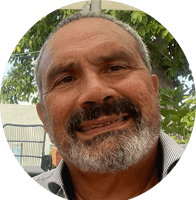
Tico Vos is a professional photographer, producer, and tourism specialist. He has been documenting the History, Culture, and News of Curaçao. This site is a documentation of the history of Manuel Carlos Piar.

